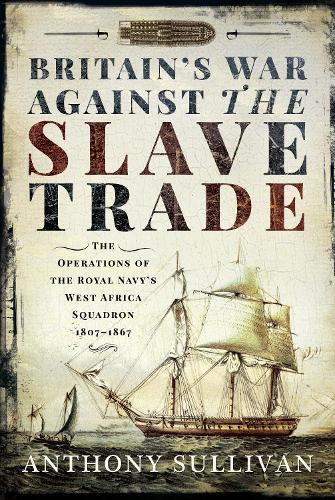
Britain's War Against the Slave Trade: The Operations of the Royal Navy s West Africa Squadron, 1807 1867
(Paperback)
Publishing Details
Britain's War Against the Slave Trade: The Operations of the Royal Navy s West Africa Squadron, 1807 1867
By (Author) Anthony Sullivan
Pen & Sword Books Ltd
Frontline Books
5th May 2023
30th May 2023
United Kingdom
Classifications
General
Non Fiction
Slavery, enslaved persons and abolition of slavery
359.00941
Physical Properties
Paperback
400
Width 156mm, Height 234mm
Description
In Britain's War Against the Slave Trade, naval historian Anthony Sullivan reveals the story behind this little-known campaign by Britain to end the slave trade. Long before recorded history, men, women and children had been seized by conquering tribes and nations to be employed or traded as slaves. Greeks, Romans, Vikings and Arabs were among the earliest of many peoples involved in the slave trade, and across Africa the buying and selling of slaves was widespread. There was, at the time, nothing unusual in Britain's somewhat belated entry into the slave trade, transporting natives from Africa's west coast to the plantations of the New World. What was unusual was Britain's decision, in 1807, to ban the slave trade throughout the British Empire. Britain later persuaded other countries to follow suit, but this did not stop this lucrative business. So the Royal Navy went to war against the slavers, in due course establishing the West Africa Squadron which was based at Freetown in Sierra Leone. This force grew throughout the nineteenth century until a sixth of the Royal Navy's ships and marines was employed in the battle against the slave trade. Between 1808 and 1860, the West Africa Squadron captured 1,600 slave ships and freed 150,000 Africans. The slavers tried every tactic to evade the Royal Navy enforcers. Over the years that followed more than 1,500 naval personnel died of disease or were killed in action, in what was difficult and dangerous, and at times saddening, work. In Britain's War Against the Slave Trade, naval historian Anthony Sullivan reveals the story behind this little-known campaign by Britain to end the slave trade. Whereas Britain is usually, and justifiably, condemned for its earlier involvement in the slave trade, the truth is that in time the Royal Navy undertook a major and expensive operation to end what was, and is, an evil business. AUTHOR: Anthony Sullivan was born in London but has spent most of his life in Surrey. He is a postgraduate of the Open University, where he studied history, and is a member of the Naval Records Society. His first book was the well-received biography of Admiral Sir James Saumarez, Man of War (2017).
Author Bio
ANTHONY SULLIVAN was born in London but has spent most of his life in Surrey. He is a postgraduate of the Open University, where he studied history, and is a member of the Naval Records Society. His first book was the well-received biography of Admiral Sir James Saumarez, Man of War (2017).
